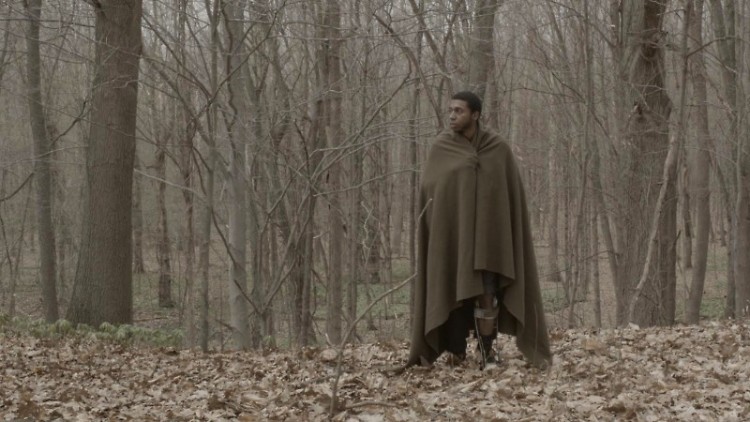Joel Potrykus’s third feature length film, "The Alchemist Cookbook," finds the Grand Rapids-based director solidifying his reputation as micro-budget auteur, while delving into some of the darkest subject matter of his career. The movie follows Sean (Ty Hickson) as he stays holed up in his trailer in the backwoods of Allegan, Michigan. Isolated, he obsessively pursues his studies of alchemy to turn lead to gold and amass his own fortune. As his medication runs out desperation and paranoia kick in, causing Sean to turn to black magic to reach his goals. But instead of discovering the wealth he desires, Sean stumbles across an ancient evil far more sinister than he bargained for.
If this sounds anything like a standard, conventional horror film, I can assure you it most certainly is not. "The Alchemist Cookbook" is a strange sort of hybrid. The first half of the film can more accurately be described as a paranoid drama with a generous dose of dark humor; the second half remains firmly planted in the horror genre, albeit Potrykus’s own offbeat version of it.
The film opens with Sean standing in front of his ramshackle trailer in the woods, working on his generator. As he pulls the cord and the generator roars to life a hip hop track from Detroit rapper Esham kicks in and sets the movie into motion. We’re quickly introduced to Sean’s life’s work as he slices at batteries and cooks vials of colorful liquids in his makeshift stovetop-lab. It’s obvious from the get-go he is deeply embroiled in his alchemic endeavors, but how he got here, well, that’s hard to tell.
The audience does get small insights into Sean’s history. Early on we see a picture of what can be presumed is his family; later we see a stack of letters requesting court appearances, and pill bottles filled with unspecified medication. While these clues are laid out in plain sight it’s up to the audience to piece these bits of information together and come up with their own version of Sean’s murky backstory. It’s a brilliant method of storytelling that invites the audience to interact with the film and inspect each and every detail in an effort to make sense of what’s going on. It also ensures that the viewer will find new things to mull over with each subsequent viewing.
Potrykus further eschews conventional storytelling for a good portion of the movie by having the camera follow Sean around in menial, and seemingly random day-to-day activities. While the movie certainly plays out in linear fashion, these scenes feel like less a way to progress the plot, and more of a way to give intimate glimpses into Sean’s character and broken psyche. Left alone in the woods Sean dances on fallen trees, splashes carelessly through puddles, and stops to gaze at the sunset over a small lake. In contrast, when his cousin Cortez (portrayed hilariously by Amari Cheatom) shows up with supplies, Sean is markedly withdrawn, reserved, and jumps at the chance to chastise Cortez for any discrepancies between his grocery list and the supplies Cortez brought to the woods. It is through his actions we can surmise Sean has become accustomed to isolation, and prefers to interact with the outside world as little as possible. He prefers to live in a pleasantly anarchic world untainted by societal pressures and rules.
Cortez, on the other hand, is a loud-mouthed, wanna-be gangsta whose interests include monogrammed jackets, bling, and the Schwarzenegger/Belushi buddy-cop classic "Red Heat." In many ways Cortez attempts to be Sean’s lifeline to civilized society; not only does he bring Sean food and supplies, he also brings mixtapes, movies, and plenty of conversation. He also brings comedic relief to the film in his off-the-cuff remarks and antics (including an unforgettable scene that involves cat food, dares, and macho pride). Of course, as the film progresses into darker territory, so do the characters of both Sean and Cortez.
When the time does come to scare the audience Potrykus isn’t lazy about it. He doesn’t resort to jump scares, CGI creatures, or other such crutches horror movies rely upon so much as of late. Instead, Potrykus prefers to employ psychological scare tactics of films such as "Rosemary’s Baby," "The Blair Witch Project," or "House of the Devil," all films that arguably leave the scariest moments up to the audience’s imagination. Off-screen sound is utilized in ways that will send shivers down your spine. A shadowy figure may sway behind a tree, but it’s just enough out of sight so we can’t make out many features. Potrykus effectively hints at the terror that’s present, and again allows the audience to fill in the rest of the spooky details themselves.
While I have enjoyed many aspects of Potrykus’s past projects, I found "The Alchemist Cookbook" to be his most cohesive, enjoyable film yet. It is undeniably a Potrykus production brimming with familiar themes of paranoia, delusions, and isolation, all served with a generous dose of junk food and biting dark humor. From the eclectic soundtrack (blasted almost exclusively from Sean’s boombox) to the tight script and brilliant cinematography, every aspect of the film converges to bring to fruition a wholly unique vision and mood. In short, "The Alchemist Cookbook" is a film that takes conventional horror ideas and turns them on their head. It may not appeal to everyone, but those of us who are willing to let Potrykus guide us through his twisted dark fantasies are on a surefire path to find cinematic gold.
Written by Josh Spanninga, contributing writer and community contributor for the UICA.
The Rapidian, a program of the 501(c)3 nonprofit Community Media Center, relies on the community’s support to help cover the cost of training reporters and publishing content.
We need your help.
If each of our readers and content creators who values this community platform help support its creation and maintenance, The Rapidian can continue to educate and facilitate a conversation around issues for years to come.
Please support The Rapidian and make a contribution today.



